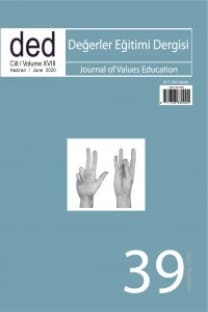Toplumsal ve Siyasî Arka Planlar Açısından İsrail'in Eğitim Sisteminde Dinin Yeri
İsrail, Din Eğitimi, Devlet Eğitimi, Siyonizm, Yahudilik
The Place of Religion in Israel’s Educational System in Terms of Social and Political Backgrounds
Israel, Religious Education, State Education, Zionism, Judaism.,
___
Abu-Nimer, M. (2004). Education for coexistence and Arab-Jewish encounters in Israel: Potential and challenges. Journal of Social Issues, 60 (2), 405-423.Bar-Lev, M. (1984). Israel. In A Dictionary of Religious Education (Ed. J. M. Sutcliffe). London: SCM Press
Bekerman, Z. & Horenczyk, G. (2004). Arab-Jewish bilingual coeducation in Israel: A long-term approach to intergroup conflict resolution. Journal of Social Issues, 60 (2), 389-405.
Boyer, A. (1992). Siyonizmin kökenleri (çev. V. Aytar). İstanbul: İletişim Yay.
Brickman, W. W. (1971). Israel. The Encyclopedia Of Education. The Macmillan Company & The Free Press.
Çağlayan, S. (2004). İsrail sözlüğü: Siyonistler, muhalifler, tarihçiler, eylemciler, yerleşimciler, İsrailliler. İstanbul: İletişim Yay.
Dwairy, M. (2004). Culturally sensitive education: Adapting self-oriented assertiveness training to collective minorities. Journal of Social Issues, 60 (2), 423-437.
Elazar, D. J. (1995). Education in a society at a crossroads: Implications for the study or Israel’seducation system. Jerusalem: Institute for the Study of Educational Systems.
Erinç, S. (2001). İsrail. İslâm Ansiklopedisi içinde (Cilt 23, s. 181-183). İstanbul: Türkiye Diyanet Vakfı Yayınları.
Firer, R. & Adwan, S. (2004). The narrative of the Israeli-Palestinian conflict in textbooks of both nations. Hannover: Hahn.
Gross, Z. (2003). State-religious education in Israel: Between tradition and modernity. Prospects, 33 (2), 149-164
İlhan, S. (2001). İsrail: Ülkede İslâmiyet. İslâm Ansiklopedisi içinde (23, 188-191). İstanbul: Türkiye Diyanet Vakfı Yayınları.
İsrail Ankara Büyükelçiliği: web adresinden 15 Mart 2005 tarihinde edinilmiştir.
Leirvik, O. Religion, Education and (in)tolerance in the Palestinian / Israeli context. web adresinden 30 Nisan 2005 tarihinde edinilmiştir.
Lindsay, B. & Parrott, J. (1998). New challenges for educational and social policies iinternational settings: A review essay. Comparative Education, 34 (3), 341-347.
Metz, H. C. (ed.) (1988). A country study: Israel. Library of Congress, http://lcweb2.loc.gov/frd/cs/iltoc.html web adresinden 7 Nisan 2005 tarihinde edinilmiştir.
Özmen, S. (2001). Ortadoğu’da etnik, dinî çatışmalar ve İsrail. İstanbul: IQ Kültür Sanat Yay.
Palestinian National Authority Ministry of Education, 2004-2005 Statistics www.moe.gov.ps/statistics.htm web adresinden 10 Nisan 2005 tarihinde edinilmiştir.
PCDC - Palestinian Curriculum Development Center (1998). First Palestinian Curriculum Plan. Palestinian National Authority Ministry of Education. http://www.pcdc.edu.ps/first_curriculum_plan.doc web adresinden 10 Nisan 2005 tarihinde edinilmiştir
Peled, A. R. (2001). Debating Islam in the Jewish State: The development of policy toward Islamic institutions in Israel. Albany: State University of New York Pres.
Reiss, W. (t.y.) Palestinian Textbooks on the Subject of Islamic Religion, Reviews of current Israeli and Palestinian textbooks. Georg Eckert Institute for International Textbook
Research http://www.gei.de/english/projekte/israel.shtml web adresinden 15 Mart 2005 tarihinde edinilmiştir
Rosenak, M. (1987). Commandments and concerns: Jewish religious education in secular society. Philadelphia: The Jewish Publication Society.
Rosevitz, S., Elazar, D. J. & Marom, Z. R. (1993). Trends in the Israel education budget in the 1980’s. Jerusalem: Institute for the Study of Educational Systems.
Shamai, S. (2000). Cultural shift: The case of Jewish religious education in Israel. British Journal of Sociology of Education, 21 (3), 401-417.
Silver, M. (1998). Respecting the wicked child: A Phiolosophy of secular Jewish identity and education. Amherst: University of Massachusetts Press
Sprinzak, D., Bar, E., Segev, Y., & Levi-Mazloum, D. (2004). Facts and figures. Jerusalem: Ministry of Education Culture and Sport. web adresinden 11 Nisan 2005 tarihinde edinilmiştir
Stephan, C. W., Lazarowitz, R. H., Zelniker, T., & Stephan, W. G. (2004). Introduction to improving Arab-Jewish relations in Israel: Theory and practice in coexistence educational programs. Journal of Social Issues, 60 (2), 237-253.
Stern, A. (1997). İsrail’de Çerkes azınlığa yönelik eğitim politikası. Contact Bulletin, 14 (1). http://www.kafder.org.tr/nart.php?yazi_id=330 web adresinden 15 Mart 2005 tarihinde edinilmiştir
Şami, R. A. (2002). Din devleti İsrail: İsrail’de dinî cemaat ve partiler (çev. M. A. Kara). İstanbul: İlke Yayınları.
The Jewish Agency for Israel. The Educational System in Israel. web adresinden 12 Şubat 2005 tarihinde edinilmiştir World Zionist Organization-The Hagshama Department. The Educational System in Israel. web adresinden 7 Nisan 2005 tarihinde edinilmiştir
- ISSN: 1303-880X
- Yayın Aralığı: 2
- Başlangıç: 2003
- Yayıncı: Ensar Neşriyat Ticaret A.Ş.
Ruh Sağlığı Bağlamında Dindarlığın Öz Saygı ve Kaygı ile İlişkisi: Çukurova Üniversitesi Örneği
Toplumsal ve Siyasî Arka Planlar Açısından İsrail'in Eğitim Sisteminde Dinin Yeri
Müslüman Toplumlarda İnsan Hakları ve Demokrasiye Saygıyı Artıracak Bazı İslâmî İlkeler
Ergenlerde Ölüm Düşüncesi, İntihar ve Din
Hayata Anlam Vermede Dinî Değerlerin ve Din Öğretiminin Rolü
Ceza Evlerinde Din Eğitiminin Temel Problemlerine Genel Bir Bakış
